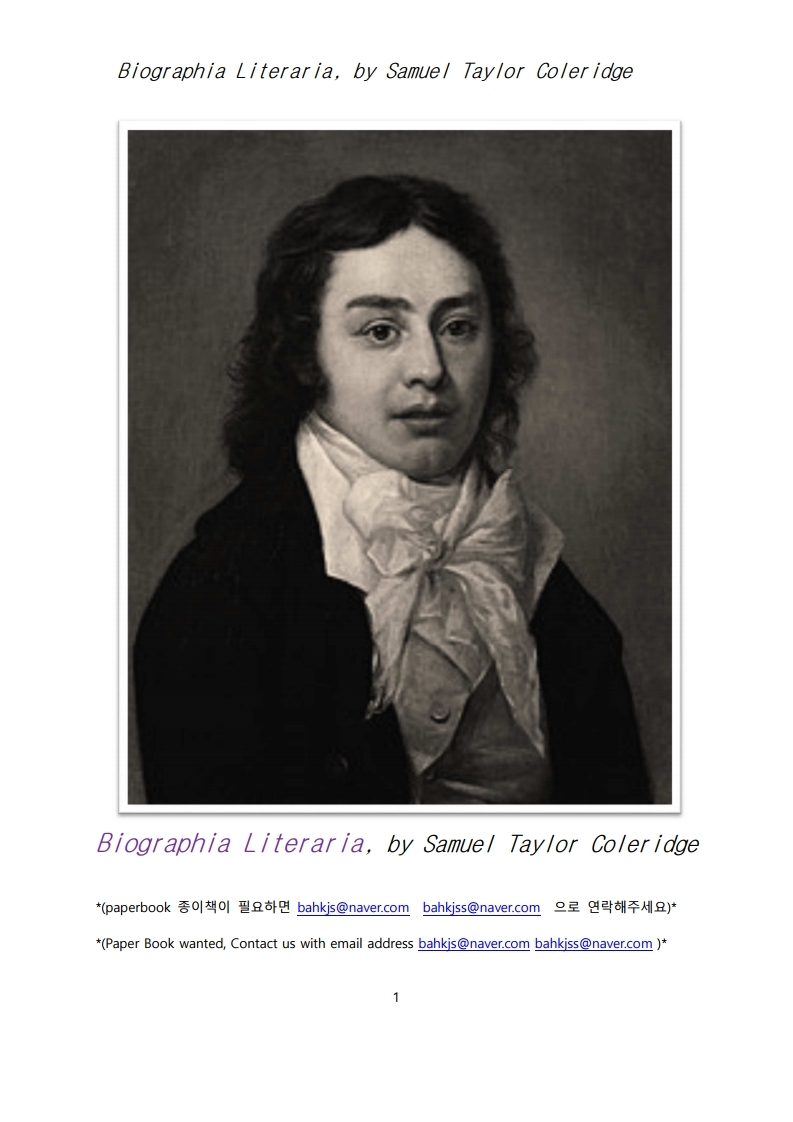콜리지의 전기문학평전.Biographia Literaria, by Samuel Taylor Coleridge
CONTENTS
DETAILED CONTENTS
BIOGRAPHIA LITERARIA
CHAPTER I
CHAPTER II
CHAPTER III
CHAPTER IV
CHAPTER V
CHAPTER VI
CHAPTER VII
CHAPTER VIII
CHAPTER IX
CHAPTER X
CHAPTER XI
CHAPTER XII
CHAPTER XIII
CHAPTER XIV
CHAPTER XV
CHAPTER XVI
CHAPTER XVII
CHAPTER XVIII
CHAPTER XIX
CHAPTER XX
CHAPTER XXI
CHAPTER XXII
SATYRANE'S LETTERS
CHAPTER XXIII
CHAPTER XXIV
CONCLUSION
FOOTNOTES
LIST OF CONTENTS
CHAP.
I Motives to the present work―Reception of the Author's first
publication―Discipline of his taste at school―Effect of
contemporary writers on youthful minds―Bowles's Sonnets―
Comparison between the poets before and since Pope
II Supposed irritability of genius brought to the test of
facts―Causes and occasions of the charge―Its injustice
III The Author's obligations to Critics, and the probable
occasion―Principles of modern criticism―Mr. Southey's
works and character
IV The Lyrical Ballads with the Preface―Mr. Wordsworth's
earlier poems―On Fancy and Imagination―The investigation
of the distinction important to the Fine Arts
V On the law of Association―Its history traced from Aristotle
to Hartley
VI That Hartley's system, as far as it differs from that of
Aristotle, is neither tenable in theory, nor founded
in facts
VII Of the necessary consequences of the Hartleian Theory―Of
the original mistake or equivocation which procured its
admission―Memoria technica
VIII The system of Dualism introduced by Des Cartes―Refined
first by Spinoza and afterwards by Leibnitz into the
doctrine of Harmonia praestabilita―Hylozoism―Materialism
―None of these systems, or any possible theory of
Association, supplies or supersedes a theory of
Perception, or explains the formation of the Associable
XI Is Philosophy possible as a science, and what are its
conditions?―Giordano Bruno―Literary Aristocracy, or the
existence of a tacit compact among the learned as a
privileged order―The Author's obligations to the Mystics-
To Immanuel Kant―The difference between the letter and
The spirit of Kant's writings, and a vindication of
Prudence in the teaching of Philosophy―Fichte's attempt
도서소개
저자소개
목차소개





